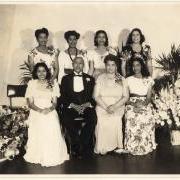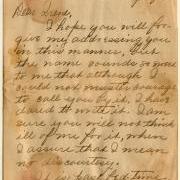By Amber L. Moore, Project Archivist, Amistad Research Center
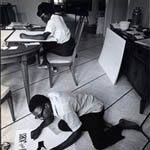 “Working for Freedom: Documenting Civil Rights Organizations” is a collaborative project between Emory University’s Manuscript, Archives and Rare Book Library, The Auburn Avenue Research Library on African American Culture and History, The Amistad Research Center at Tulane University, and The Robert W. Woodruff Library of Atlanta University Center to uncover and make available previously hidden collections documenting the Civil Rights Movement in Atlanta and New Orleans. The project is administered by the Council on Library and Information Resources with funds from the Andrew W. Mellon Foundation. Each organization regularly contributes blog posts about their progress.
“Working for Freedom: Documenting Civil Rights Organizations” is a collaborative project between Emory University’s Manuscript, Archives and Rare Book Library, The Auburn Avenue Research Library on African American Culture and History, The Amistad Research Center at Tulane University, and The Robert W. Woodruff Library of Atlanta University Center to uncover and make available previously hidden collections documenting the Civil Rights Movement in Atlanta and New Orleans. The project is administered by the Council on Library and Information Resources with funds from the Andrew W. Mellon Foundation. Each organization regularly contributes blog posts about their progress.
For more information about the collection described in this post, please contact the Amistad Research Center, reference [at] amistadresearchcenter [dot] org
Amistad staff are pleased to announce that the guide for the John Wesley Dobbs Family papers is available online. John Wesley Dobbs, civil rights activist and patriarch of a prominent family in Atlanta, Georgia, fought for African American suffrage and integration. The father of six daughters, Dobbs insisted his children pursue excellence and stressed the importance of education and first class citizenship. He founded the Georgia Voters League (1935) and headed the Grand Lodge of Prince Hall Freemasons (1932-1961).
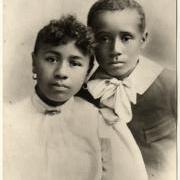 |
| J.W. Dobbs and sister Willie, circa 1890. (Click to enlarge.) |
Dobbs, son of William and Minnie M. (nee Hendricks), was born on March 26, 1882, in Kennesaw, Georgia. When Dobbs was two years old; his parents separated and his mother moved to Savannah, Georgia, to find work. For the first nine years of his life, Dobbs and older, sister Willie, lived with their paternal grandparents on a farm in near Marietta, Georgia. In 1891, Minnie sent for her children to live with her in Savannah. There, Dobbs completed grammar school (1897) at West Broad Street School while working various jobs, such as delivering the Savannah Press newspaper and shining shoes at the local barber shop.
At the age of 15, Dobbs moved to Atlanta where he obtained his high school diploma from the Atlanta Baptist College (Morehouse College) in 1901. He enrolled in the freshman class of Morehouse College, but left shortly thereafter to return to Savannah to take care of his ailing mother. Although he never earned his college degree, he maintained “a thirst for knowledge” and independently studied literature, history, and philosophy throughout his life. In 1903, he took the civil service examination and was certified with the railway mail service for the Atlanta to Nashville mail run, a post he held for 32 years. He started as a clerk and was later promoted to Chief Clerk in charge of a crew of white men.
In 1906, he married Irene Ophelia Thompson (1885-1972) of Columbus, Mississippi, and the couple bore six daughters: Irene Carolyn, Willie Juliet, Millicent Doris, Josephine Ophelia, Mattiwilda, and June Serena.
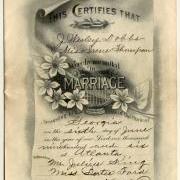 |
| Marriage Certificate- John Wesley Dobbs and Irene Thompson, 1906. (Click to enlarge.) |
He joined the Prince Hall Freemasons, a fraternal order which attracted the black middle class, in 1911. He served as the Grand Lodge Officer (1914-1924) and Secretary-treasurer of the Masonic Relief Association (1924-1924), which was the financial department of the Grand Lodge. In 1932, he was elected as Grand Master of the State in the United Supreme Council, Thirty-Three Degree, Southern Jurisdiction and re-elected every year for the remainder of his life.
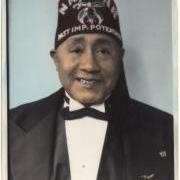 |
| John Wesley Dobbs, undated. (Click to enlarge.) |
In 1935, he founded the Atlantic Civic and Political League and became first president. The goal of the league was “to awaken Atlanta Negroes to their civic and political consciousness” through the use of the ballot. He was also the founder and president of the Georgia Voters League which registered approximately 175,000 African American voters in 1961. He headed the Georgia State-Wide Registration Committee, co-founded the Atlanta Negro Voters League, and served as vice-chairman of the Georgia State Central Committee of the Republican Party and national vice-president of the National Association for the Advancement of Colored People.
The papers document the personal and professional lives of the John Wesley Dobbs family of Atlanta, Georgia. The key topics are civil rights, education, integration, race relations, and African American suffrage. The main strengths are the civil rights activities of the family as well as J.W. Dobb’s tenure as Grand Master of Prince Hall Masonic Grand Lodge of Georgia. The collection encompasses 5.8 linear feet of correspondence, photographs, programs, sound recordings, speeches, and news clippings.

